Bitcoin as the New Pillar of Wealth Preservation: A Paradigm Shift from Real Estate
- Bitcoin challenges real estate as a wealth preservation pillar, offering liquidity, inflation resistance, and global accessibility. - Real estate retains appeal via stable rental income and tangible value but faces illiquidity and regional volatility risks. - 2025 data shows 3,112% Bitcoin returns vs. 3% real estate appreciation, driving hybrid strategies blending crypto gains with property investments. - Market shifts reflect philosophical change: decentralized Bitcoin aligns with digital-native investo
The global investment landscape is undergoing a seismic shift. For decades, real estate has been the bedrock of wealth preservation, offering tangible assets, rental income, and long-term appreciation. However, Bitcoin’s emergence as a decentralized, inflation-resistant asset is challenging this status quo. By 2025, the migration of value from traditional real estate to digital assets has accelerated, driven by Bitcoin’s unique attributes and the evolving needs of a tech-savvy, globally connected investor base [1].
The Case for Bitcoin: Liquidity, Inflation Hedge, and Accessibility
Bitcoin’s appeal lies in its ability to address critical limitations of real estate. Unlike property, which requires months to transact and is geographically constrained, Bitcoin offers near-instant liquidity and borderless utility. A 30% correction in Q3 2025 to $75,000, while alarming, aligns with historical patterns of accumulation by long-term holders, as evidenced by on-chain metrics like the MVRV Z-Score (1.43) and Value Days Destroyed (VDD) [1]. These signals suggest a bear market consolidation rather than a terminal decline, mirroring cycles in 2017 and 2021.
Moreover, Bitcoin’s deflationary model—capped at 21 million coins—positions it as a superior hedge against monetary debasement. In an era of persistent inflation (core U.S. inflation at 3.1% in 2025), Bitcoin’s scarcity contrasts sharply with real estate’s vulnerability to local market fluctuations and high maintenance costs [3]. For instance, a $100,000 investment in Bitcoin five years prior would have yielded a 3,112% return, dwarfing real estate’s average 3% annual appreciation [4]. This stark ROI disparity has drawn younger investors, who prioritize flexibility and digital-first solutions [1].
Real Estate’s Enduring Strengths: Stability and Passive Income
Real estate remains a cornerstone for many due to its tangible nature and consistent income generation. Rental yields, tax deductions on mortgage interest, and long-term appreciation provide a buffer against Bitcoin’s volatility. In Q2 2025, properties in emerging neighborhoods near infrastructure projects still delivered robust returns, even as mortgage rates lingered at 6.8% [2]. Additionally, real estate offers lifestyle benefits—physical shelter, community ties, and intrinsic value—that digital assets cannot replicate [6].
However, the asset class is not without flaws. High entry barriers, illiquidity, and regional disparities (e.g., sharper price declines in the South and West) limit its accessibility [2]. For investors seeking diversification, real estate’s role is evolving: some are using crypto gains to fund property purchases, blending the best of both worlds [6].
A Paradigm Shift: From Bricks to Bytes
The 2025 data underscores a broader trend: value migration from real estate to Bitcoin. While real estate ETFs like the SPDR S&P Homebuilders ETF (XHB) posted a 10.45% year-to-date return, the iShares U.S. Home Construction ETF (ITB) plummeted 24% over six months, reflecting sector fragility [2]. Meanwhile, Bitcoin’s Q3 volatility, though pronounced, has historically signaled a bullish resumption in Q4, with July performance often predicting a green second half [3].
This shift is not merely financial but philosophical. Bitcoin’s decentralized nature aligns with a generation disillusioned by traditional institutions, while its programmable money features enable innovations like tokenized real estate, fractional ownership, and automated smart contracts [6]. As blockchain adoption grows, the lines between digital and physical assets will blur further.
Conclusion: Balancing the Old and the New
Bitcoin is not a panacea but a transformative force reshaping wealth preservation. For risk-tolerant investors, its high ROI and inflation hedge make it a compelling alternative to real estate. Yet, real estate’s stability and passive income remain irreplaceable for conservative portfolios. The future likely lies in hybrid strategies: using Bitcoin’s liquidity to fund real estate ventures or tokenizing property to enhance accessibility.
As the 2025 data illustrates, the paradigm shift is underway. Whether Bitcoin fully supplants real estate as the pillar of wealth remains to be seen, but one truth is clear: the era of digital-first asset allocation has arrived.
Source:
[1] Why Bitcoin Will Disrupt Real Estate: A New Era in Property Investment
[2] Housing Market Momentum in Q3 2025: Decoding New Home Sales as a Leading Indicator for Real Estate and Construction Sector Investments
[3] Bitcoin July Stats Hint at Q3 and H2 2025 Upside
[4] Bitcoin vs. Traditional Assets
Disclaimer: The content of this article solely reflects the author's opinion and does not represent the platform in any capacity. This article is not intended to serve as a reference for making investment decisions.
You may also like
Dissecting Curve DAO’s price action as CRV eyes another support test

Damaging Impact: Cardano Founder Reveals How Trump’s Crypto Moves Hurt the Market
Crucial Alert: CoinMarketCap’s Altcoin Season Index Plummets to a Weak 17